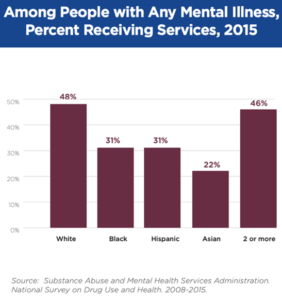 Anyone can experience the challenges associated with mental illness regardless of their identities and backgrounds. However, one’s background and identity can make it more challenging to seek necessary mental health treatment, as multicultural communities often face issues when attempting to receive care for mental health. Not only may there be the inaccessibility of high-quality mental health care services, but the cultural stigmas that are being labelled, discrimination, and lack of awareness about mental health are considered the contributing factors causing difficulty to seeking mental health care. As to address the issues, Bebe Moore Campbell, an American author, journalist, teacher, and mental health advocate established the National Minority Mental Health Awareness Month. The establishment was set in June 2008 and the National Minority Mental Health Awareness Month is observed annually in the month of July every year.
Anyone can experience the challenges associated with mental illness regardless of their identities and backgrounds. However, one’s background and identity can make it more challenging to seek necessary mental health treatment, as multicultural communities often face issues when attempting to receive care for mental health. Not only may there be the inaccessibility of high-quality mental health care services, but the cultural stigmas that are being labelled, discrimination, and lack of awareness about mental health are considered the contributing factors causing difficulty to seeking mental health care. As to address the issues, Bebe Moore Campbell, an American author, journalist, teacher, and mental health advocate established the National Minority Mental Health Awareness Month. The establishment was set in June 2008 and the National Minority Mental Health Awareness Month is observed annually in the month of July every year.
In 2016, the American Psychiatric Association reported that there was approximately 18% of adults in the U.S. develop diagnosable mental disorders, while 4% of adults have a serious mental illness. Although many racial or ethnic minority groups overall report similar or even fewer mental disorders than whites, yet the consequences of mental illness in minorities may be long-lasting.
Here are some facts about mental health in ethnic/racial minorities:
- Ethnic or racial minorities are more likely to bear a higher burden of disability resulting from mental disorders.
- Individuals who identify as being two or more races (24.9%) are most likely to report any form of mental illness than any other racial or ethnic group.
- Underdiagnosis and/or misdiagnosis of mental illness in individuals from racially or ethnically diverse populations may be due to health care providers’ lack of cultural understanding.
- Factors include language differences between patient and provider, the stigma of mental illness among minority groups, and cultural presentation of symptoms.
- In 2015, it was reported that people from racial/ethnic minority groups are less likely to receive mental health care. As shown in the chart, 48% of adults with any mental illness who seek mental health care were whites, adults from other racial/ethnic groups showed lower rates.
To spread the awareness and support Bebe Moore Campbell National Minority Mental Health Awareness Month, NAMI will continue to amplify the message of “You Are Not Alone.” This quote applies to all individuals who are affected by mental illness, regardless of one’s background, culture, ethnicity, or identity. Everyone deserves to get the appropriate support and quality of care, no one should be feeling alone in their struggle. More information can be found on NAMI’s website.
At EAP, we will be introducing a series of articles to celebrate National Minority Mental Health Awareness Month. We will be featuring mental health facts and resources for several minority groups in our upcoming MENTOR articles.
Reference:
https://www.psychiatry.org/psychiatrists/cultural-competency/education
By, Jessica Lau, MHC Intern
